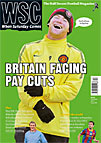 Cameron Carter raises the question of quality versus quantity in football punditry
Cameron Carter raises the question of quality versus quantity in football punditry
A common and unnerving feeling experienced by the middle-aged person is the suspicion that they are being hurried along. Time appears to pass more quickly – calendar events flash by, children age and learn to look at us sarcastically, Rory McGrath makes another series out of wandering around Britain drinking real ale. This creeping sense of urgency has long since intruded into the world of television, to the extent that it is now almost unbearable to watch an interviewee pause, introduce a subordinate clause or stumble over their words, so brief is the space given to them to make their point before their chance is gone and the programme must move on.
Into this bewildering environment enters Pardon The Interruption, ESPN’s anglicised version of their popular American sporting debate show. In the US programme, two extrovert journalists bawl opinions on current sporting affairs at each other over a series of topical subjects, each discussion point lasting just one minute. While their American counterparts fill the room with their reliably constructed differences of opinion, British sportswriters Steve Bunce and Mark Chapman’s presentation has more of the pathos of a two-man birthday party.
They rarely stumble in their headlong plunge to the bottom of the programme but it is still not clear why they only have 30 seconds each to cover a topic. Probably for the same reason Changing Rooms has a time limit – to foster the impression something diverting, rather than mundane, is happening. If you added a time limit to bridge construction, for example, it might make the act more interesting to watch, but a similar sensation that we are being short-changed somehow would remain.
For some of us, any passing enjoyment of at least the rapidity of opinion on the October 5 edition of PTI (as they like to call it) was extinguished the moment Steve Bunce referred to himself by his own nickname. One doesn’t mind a man being high-octane and irreverent, but referring to himself as “Buncey” at the same time is just a little more than the human spirit can endure.
Perhaps the best way to look at this programme is as a Public Information film depicting the way the government would prefer its male citizens to talk in pubs – buoyantly discursive and sports-based, rather than dreaming of a new interpretation of Spinoza’s naturalism or fiddling with their metrosexual mobile phones while discussing after-school childcare. Dan Walker once tried a shortened copycat version of Pardon The Interruption on Football Focus with his panel of sturdy-minded ex-players, but this came across like a young man trying to chivvy a group of maiden aunts into playing charades at Christmas and the borrowed idea has since been quietly dropped.
At the beginning of October Gary Lineker presented a documentary called Can England Win The Next World Cup?, rather a provocative title for English viewers, taking into account the team’s performance at the last one. Arguments that the Premier League contains too few English players, that young players are taught here to compete and win rather than to work on their technique, and that England has a comparatively small amount of qualified coaches, would seem to indicate that, no, England won’t win the next World Cup because it is less than four years away.
When asked if a winter break might help, Richard Scudamore explained patiently that there was no evidence that this has been beneficial for other countries. This may surprise the Spanish, Dutch and the Germans, who did rather better than England in June. Jürgen Klinsmann got a bit carried away talking about the revitalised, entertaining German team: “It’s a nation that likes to attack, unfortunately twice in a bad way in the last century!” It is possible that the Belgians in 1914 and the Polish in 1939 thought to themselves “This Blitzkrieg tactic of the German army is appallingly effective, one can only hope they play their football in the same purposeful and decisive manner”, but they may not have had time for idle reflection.
It was Jürgen again who provided what might be the most workable way forward for English football with his assertion that slow, clever football cannot be played in England because of the energy and demands of the crowds. This at least gives England fans back some control over the perpetually frustrating ritual of watching the team underachieve in tournaments. So remember, if you want England to do well in the European Championship, try shutting the fuck up.
From WSC 286 December 2010